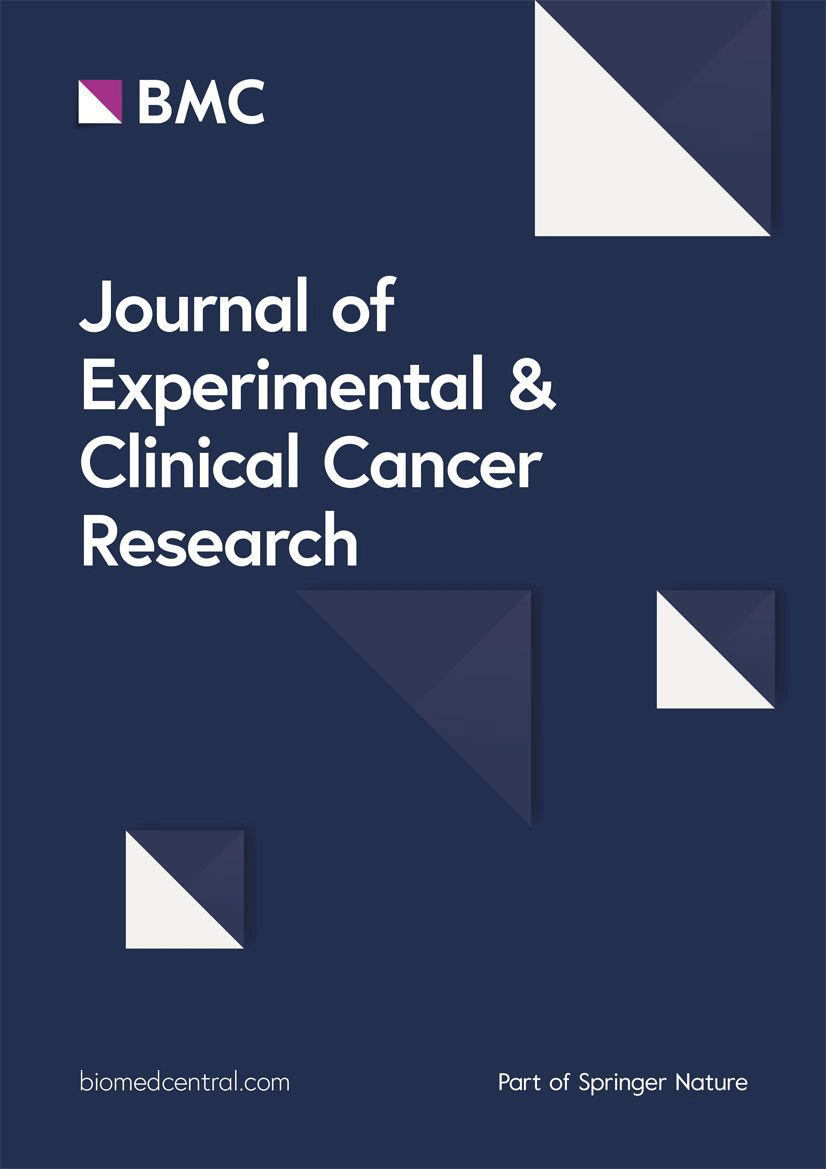利用体外重编程巨噬细胞的细胞疗法可增强黑色素瘤的抗肿瘤免疫反应
IF 11.4
1区 医学
Q1 ONCOLOGY
Journal of Experimental & Clinical Cancer Research
Pub Date : 2024-09-14
DOI:10.1186/s13046-024-03182-w
引用次数: 0
摘要
基于巨噬细胞的细胞疗法在临床试验中取得了一定的成功,这可归因于它们的表型可塑性,即移植的巨噬细胞会被重新编程,变成有利于肿瘤的表型。在包括黑色素瘤在内的大多数肿瘤类型中,抗肿瘤的M1样巨噬细胞和促进肿瘤的M2样巨噬细胞之间的平衡对于确定局部免疫反应至关重要,较高的M1/M2比例有利于抗肿瘤免疫。因此,设计新的策略来提高TME中的M1/M2比例具有很高的临床意义,并有利于基于巨噬细胞的细胞疗法。在这项研究中,我们用 HDAC6 抑制剂(HDAC6i)对体内外的抗肿瘤巨噬细胞和促炎巨噬细胞进行了重编程。我们将重编程的巨噬细胞作为一种采用性细胞疗法(ACT),在合成SM1小鼠黑色素瘤模型和患者异种移植的NSG-SGM3人源化小鼠模型中进行肿瘤内注射。我们通过流式细胞术对肿瘤浸润免疫细胞进行了表型分析,并对肿瘤切片的巨噬细胞标记物进行了组织学分析。我们对用药物或 HDAC6i 处理的小鼠骨髓衍生巨噬细胞进行了批量 RNA-seq 分析,并对 SM1 肿瘤浸润免疫细胞进行了单细胞 RNA-seq 分析,以确定肿瘤内巨噬细胞 ACT 对肿瘤微环境 (TME) 的影响。我们进一步分析了单细胞数据,以确定关键的细胞-细胞相互作用,并进行了轨迹分析,以确定ACT后肿瘤相关巨噬细胞的命运。巨噬细胞ACT导致两种小鼠模型的肿瘤生长减弱。我们还证明,通过抑制 STAT3 介导的 M2 重编程,巨噬细胞中的 HDAC6 抑制了向肿瘤促进表型的极化。移植后两周,ACT巨噬细胞仍有生命力,抑制HDAC6可使肿瘤内移植的M1巨噬细胞在体内抗原肿瘤M2表型的极化。通过流式细胞术、单细胞转录组学和单细胞分泌组分析对肿瘤进行进一步鉴定后发现,抗肿瘤 M1 样巨噬细胞显著富集,导致 M1/M2 比率增加和 CD8 效应 T 细胞浸润。对单细胞 RNA-seq 数据进行的细胞间相互作用计算分析和轨迹分析表明,TME 中的单核细胞和 T 细胞被激活。总之,我们首次证明了用HDAC6抑制剂对体内外巨噬细胞进行重编程作为一种可行的巨噬细胞疗法来治疗实体瘤的潜力。本文章由计算机程序翻译,如有差异,请以英文原文为准。
Cell therapy using ex vivo reprogrammed macrophages enhances antitumor immune responses in melanoma
Macrophage-based cell therapies have shown modest success in clinical trials, which can be attributed to their phenotypic plasticity, where transplanted macrophages get reprogrammed towards a pro-tumor phenotype. In most tumor types, including melanoma, the balance between antitumor M1-like and tumor-promoting M2-like macrophages is critical in defining the local immune response with a higher M1/M2 ratio favoring antitumor immunity. Therefore, designing novel strategies to increase the M1/M2 ratio in the TME has high clinical significance and benefits macrophage-based cell therapies. In this study, we reprogrammed antitumor and proinflammatory macrophages ex-vivo with HDAC6 inhibitors (HDAC6i). We administered the reprogrammed macrophages intratumorally as an adoptive cell therapy (ACT) in the syngeneic SM1 murine melanoma model and patient-derived xenograft bearing NSG-SGM3 humanized mouse models. We phenotyped the tumor-infiltrated immune cells by flow cytometry and histological analysis of tumor sections for macrophage markers. We performed bulk RNA-seq profiling of murine bone marrow-derived macrophages treated with vehicle or HDAC6i and single-cell RNA-seq profiling of SM1 tumor-infiltrated immune cells to determine the effect of intratumor macrophage ACT on the tumor microenvironment (TME). We further analyzed the single-cell data to identify key cell-cell interactions and trajectory analysis to determine the fate of tumor-associated macrophages post-ACT. Macrophage ACT resulted in diminished tumor growth in both mouse models. We also demonstrated that HDAC6 inhibition in macrophages suppressed the polarization toward tumor-promoting phenotype by attenuating STAT3-mediated M2 reprogramming. Two weeks post-transplantation, ACT macrophages were viable, and inhibition of HDAC6 rendered intratumor transplanted M1 macrophages resistant to repolarization towards protumor M2 phenotype in-vivo. Further characterization of tumors by flow cytometry, single-cell transcriptomics, and single-cell secretome analyses revealed a significant enrichment of antitumor M1-like macrophages, resulting in increased M1/M2 ratio and infiltration of CD8 effector T-cells. Computational analysis of single-cell RNA-seq data for cell-cell interactions and trajectory analyses indicated activation of monocytes and T-cells in the TME. In summary, for the first time, we demonstrated the potential of reprogramming macrophages ex-vivo with HDAC6 inhibitors as a viable macrophage cell therapy to treat solid tumors.
求助全文
通过发布文献求助,成功后即可免费获取论文全文。
去求助
来源期刊
CiteScore
18.20
自引率
1.80%
发文量
333
审稿时长
1 months
期刊介绍:
The Journal of Experimental & Clinical Cancer Research is an esteemed peer-reviewed publication that focuses on cancer research, encompassing everything from fundamental discoveries to practical applications.
We welcome submissions that showcase groundbreaking advancements in the field of cancer research, especially those that bridge the gap between laboratory findings and clinical implementation. Our goal is to foster a deeper understanding of cancer, improve prevention and detection strategies, facilitate accurate diagnosis, and enhance treatment options.
We are particularly interested in manuscripts that shed light on the mechanisms behind the development and progression of cancer, including metastasis. Additionally, we encourage submissions that explore molecular alterations or biomarkers that can help predict the efficacy of different treatments or identify drug resistance. Translational research related to targeted therapies, personalized medicine, tumor immunotherapy, and innovative approaches applicable to clinical investigations are also of great interest to us.
We provide a platform for the dissemination of large-scale molecular characterizations of human tumors and encourage researchers to share their insights, discoveries, and methodologies with the wider scientific community.
By publishing high-quality research articles, reviews, and commentaries, the Journal of Experimental & Clinical Cancer Research strives to contribute to the continuous improvement of cancer care and make a meaningful impact on patients' lives.

 求助内容:
求助内容: 应助结果提醒方式:
应助结果提醒方式:


